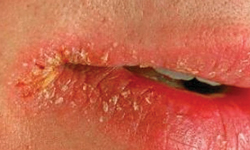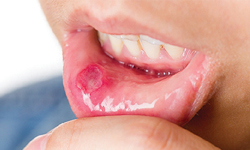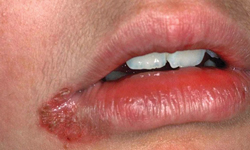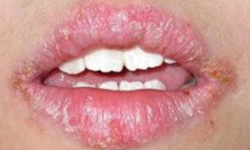Cheilosis
Cheilosis can be defined as a medical condition, in which the corners of the mouth becomes inflamed. This condition is also known as angular cheilitis, perleche or angular stomatitis. A disorder of the lips often due to riboflavin deficiency and other B-complex vitamin deficiencies and characterized by fissures, especially in the corners of the mouth.
Symptoms of Cheilosis
These are the most common symptoms of cheilosis:
• Inflammation at one or both corners of the mouth
• The lesions can be confined to the oral mucosa or spread over the vermilion border of the lips
• Gray-white thickening at the corners of the mouth
• Redness can appear in the area as well
• The skin at the corners of the mouth can break down
• As the condition progresses, fissures or cracks can appear at the site of the lesions (in more advanced cases – ulceration or atrophy)
• No haemorrhage is present
• The fissures can extend from the corners of the mouth to the rest of the facial skin
• Eczema can spread to the skin of the chin or cheek
• Golden yellow crusts can form, suggesting that the lesions are infected (most commonly with staphylococcus aureus)
• Chronic cheilosis – purulent discharge, scaling and even formation of granulation tissue
• Swollen tongue – present in those who suffer from nutritional deficiencies
• Pain
• Pruritus
• Burning sensation
Causes of Cheilosis:
Medical Experts are still not sure about what exactly causes cheilosis people. It is believed that cheilosis can be caused by a lack of essential B vitamins, especially riboflavin, which is vitamin B.
A deficiency in iron, combined with the lack of these essential vitamins, weaken the immune system further, resulting in improper functioning and repair of body’s cell, tissues and organs. People who are in the habit of constantly licking their lips also seem to be more commonly affected by this condition. Toothpastes and cosmetics can also cause this condition as they contain harsh chemicals.
Nutritional deficiencies
(mineral and vitamin)
• Iron deficiency
• Vitamin B deficiency
- Vitamin B2 deficiency
(Riboflavin)
- Vitamin B5 deficiency
(Pantothenic Acid)
- Vitamin B12 deficiency
(Cobalamin)
- Vitamin B3 deficiency
(Niacin)
- Vitamin B7 deficiency
(Biotin)
• Zinc deficiency
• Impaired absorption of zinc
• Malnutrition
o Alcoholism
o Strict vegan diet
o Gastrointestinal disorders – celiac disease, chronic pancreatitis
o Surgery at the level of the GI tract – for example, in the case of patients who undergo ileal resection, as they suffer from Crohn’s disease (pernicious anaemia may develop)
Treatments for Cheilosis
To properly treat Cheilosis, you first need to identify the cause. For minor cases, like ones brought on by dryness, a topical antibiotic will sufficiently heal lesions. Fungal and bacterial infections will usually require over-the-counter antibiotic creams, but it is a good idea to consult with a dermatologist or oral surgeon to verify the cause. A doctor will take a culture of the mouth to see if there is any yeast or bacteria present.
In instances of malabsorption, Cheilosis can be treated through the injection of B-12 or B complex shots. The amount and frequency of these injections will depend on the severity of the condition and whether or not the patient has a history of Cheilosis. Again, consulting a doctor will help you treat your Cheilosis more effectively.
Preventing Cheilosis
If you have been diagnosed with Cheilosis, you know how irritating and painful it can be. So, to prevent it from flaring up again, there are some helpful tips to follow. First, it’s essential to protect your lips by applying oil-based cream or lip balm that contains vitamin E and has an SPF of at least 15. Second, avoid licking your lips. Saliva evaporates quickly, leaving lips even drier and more prone to crack. Third, drink lots of water. Hydration is key to keeping lips healthy and moist. Fourth, maintain a well-balanced diet. If you do not consume enough iron and B vitamins through your daily meals, then opt for supplements that get you to your required daily intake of these valuable nutrients. Finally, if you wear dentures, visit your dentist often to make sure they are properly fitted and there is no irritation around your lips.
Related Posts





